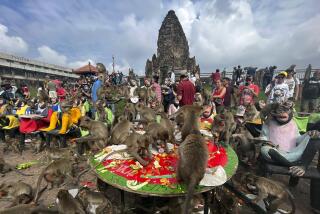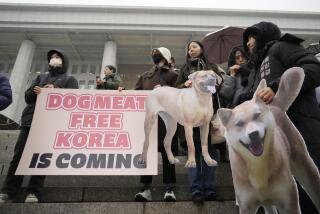An Economy That’s Gone to the Dogs
- Share via
THARAE, Thailand — “Let’s trade for fat dogs, lazy dogs and dogs that don’t bark,” blare the loudspeakers on a pickup truck.
The dog traders of northeastern Thailand are on the prowl again for man’s best friend, looking for dogs to kill for meat and hides.
The trucks carry large steel cages and a supply of plastic buckets, the bounty for dogs. When there aren’t enough strays to satisfy demand, the trucks go out to buy pet dogs from local farmers for one bucket for an average-size dog.
Unlike most towns and villages in the impoverished northeast, Tharae is a pleasant, well-off place due in large measure to its canine economy. Business is growing, as is criticism from Thai and international animal rights groups.
Residents of Tharae, a city of 16,000, say they adopted the habit of eating dog meat from Vietnamese refugees who moved into the area in the 1950s.
Chatchai Thaweedej, 24, said he’s heard the loudspeakers appealing for dogs since he was a little boy in the area, which is 335 miles northeast of Bangkok.
After canvassing the countryside, the trucks head for the butchers of Tharae, sometimes delivering hundreds of yelping dogs at a time.
Almost every part of an animal is used.
Sold at a special market in Tharae, dog meat costs as much as beef, about 70 baht for a kilogram, or $1.30 a pound, when sun-dried. It’s also used as protein supplement for cattle, fish and even other dogs.
The hide is turned into bags and drum skins, while skin from the scrotum becomes gloves for golfers. Dried penises are exported to China and Taiwan, where some people believe they will enhance sexual prowess when consumed.
Indicating the scale of the slaughter, one villager said he normally sends 5,000 to 10,000 hides at a time to the tannery. His last shipment, which took just three weeks to gather, amounted to 14,000.
“Villagers here are comfortable. Thanks to the dogs, even teenagers can afford to buy motorcycles, and there aren’t any thieves around,” he said.
The man estimated the average daily income was the equivalent of more than $12, or double the minimum legal wage.
Like most people in Tharae, he declined to give his name because of sensitivity to a wave of criticism and some efforts by Thai officials to reduce the dog business, which is legal.
A protest by the Britain-based Foundation for Dog Protection last year brought comments from some government officials that the slaughter was bad for Thailand’s international image.
The Thai Society for the Prevention of Cruelty to Animals says the killing is cruel. The dogs are starved for three days to induce submission, then clubbed on the head before their throats are slit.
But villagers say that is no different from slaughtering pigs or cows and that to eliminate the business would mean economic hardship.
“If you don’t mind that it’s a dog, you would discover that dog’s meat is sweet,” a woman said.
The anti-cruelty group is pressing the government to introduce legislation to ban dog killing, but at least for now the business’s prospects seem good.
Villagers say they have expanded their market to neighboring Laos while maintaining steady sales to their traditional customers in Taiwan and China. Meat is also reportedly exported to Vietnamese communities in Japan, the United States and some countries in Europe.
Although some officials claim dog-eating is restricted to ethnic Vietnamese, the size of the trade indicates a number of Thais aren’t averse to dining on dried canine strips or grilled liver.
More to Read
Sign up for Essential California
The most important California stories and recommendations in your inbox every morning.
You may occasionally receive promotional content from the Los Angeles Times.













